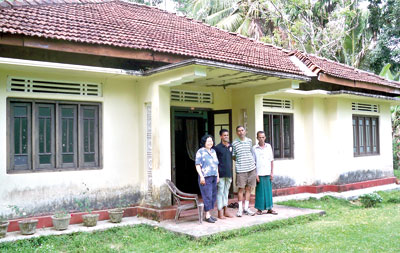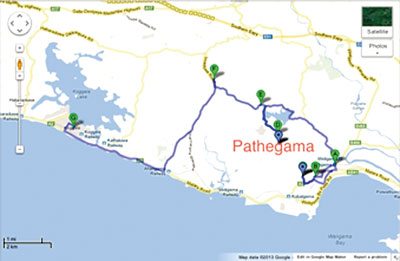Eastward Ho from ‘Home Sweet Home’ to Weligama Bay
We—my wife Yoke-Sim and I—gave top priority to visiting my birth village of Pathegama, a couple of kilometres west of Weligama, on my tour of the Deep South early April. We left the Koggala folk culture museum in the early afternoon to enter our village unannounced from the backdoor through Panchaliya.

At the house where the writer (second from right) was born, he poses with his wife (left), the current occupant of the place (second from left) and Sudu Mahattaya (Richard)
Our driver, Amal Chandrakumara, consulted the locals on how best to reach Pathegama. We left the coastal highway at the Ahangama junction, drove north on the Imaduwa Road and then east on the Panchaliya-Borala Road. [On the map, follow the backdoor route to Pathegama linking G, F, E and D. Google has dropped the Batawala-Pathegama Road that should link the unidentified points D and C, the western terminus of the Agra Bodhi Vihara Mawatha. The Panchaliya-Borala Road, E, runs directly to the Weligama city centre, A.]
Shortly, we stopped at a junction for further inquiries. To our surprise we found that we had already reached Pathegama. Furthermore, we learned that we could reach Mederikoratuwa, my father’s ancestral home, by turning left at the junction.
[My previous visit to Pathegama was 22 years ago in 1991, in the company of my mother, my younger sister Nayana and my 11-year old son Junius Asela. Chapter 17 of Vol. 1 of my autobiography, The Journey of a Journalist, describes that visit.]
In my childhood, the gravel road that took us to the back of Mederikoratuwa was informally called the Kitulegodawatta Road. The name came from the large rubber plantation in the vicinity.
My thoughts flashed back to my childhood bringing memories of visiting the home of the plantation’s conductor, whom the villagers called Kondostara Mahattaya, in the company of my father. On one occasion the English-educated conductor, dressed in trousers, entertained us with melodious gramophone music sung by the fabulous Rukmani Devi. Now, the plantation had replaced rubber with tea. I had a nostalgic longing for the smell of ottapalu (latex) that pervaded the area surrounding the estate. I don’t think I missed the ottapalu smell that much on my previous visit to Pathegama.
Even after driving well into the gravel road, I could not recall which of the homes was the property of my paternal grandfather because the residents had planted bush fences to cover their backyards from the view of passers-by. We stopped the vehicle at the first sight of an opening to our right.
“Do you know where Sudu Mahattaya (Richard) lives?” I asked a bare-chested sarong- clad man who was hesitantly moving away from the fence down the sloping terrain without an answer.Then, I told him, “I am Shelton Gunaratne visiting from America.”
He reluctantly smiled after recognising that I was one of his cousins—the older son of the postmaster (Thepal Mahattaya), the second younger brother of Richard’s father.
He promptly invited us to his home and offered us some rice with curried brinjals (eggplants) if we were hungry. He was the only one at home with his wife gone to Colombo on an errand. He recalled that I had lunch with his family on my last visit too—more than two decades ago.
Richard took us to see the grave of his older brother, Kalu Mahattaya (Francis), an attorney-at-law—the pride of his family. Francis was a contemporary of mine at the Peradeniya campus of the University of Ceylon.
The old ancestral home of Mederikoratuwa had been demolished years ago. Punchy Appuhamy, 81, an “adopted son” of my paternal grandparents, and his wife Kalu Nona now occupied the house built behind the old ancestral home. The well-to-do family of their daughter lived in a two-storey house built next door. We were impressed that their youngsters were deep into miniature digital gadgets.
A land dispute between Sudu Mahattaya and Punchy Appuhamy had soured the relations between these two families. As I too was a part owner of the property, I said they should settle their differences by mutual agreement than through legal recourse.
I went to see Punchy Appuhamy, now wheel-chair bound, to pay my respects. Kalu Nona joked with me about my shyness in my childhood. Their older daughter insisted that we visit their home for afternoon tea.

The map shows the approximate location of Pathegama
After enjoying the hospitality of the three families, we had to leave Mederikoratuwa to visit my maternal ancestral home, where I was born, a few kilometres further east at Habaradugewatte. Richard volunteered to show us the way.
But before getting there, we stopped at the site of the Batawala-Pathegama primary school, which I first attended as a child. It was this school’s headmaster (Palaveni Mahattaya) who first read the Sinhala alphabet to me at age 3. Now the school stood closed although the main building remained intact. Vanished was the house that the headmaster’s family lived. I wondered about the fate of the car he owned—the only automobile the village then had.
Meanwhile, word had got around about my arrival, and a few curious people gathered around me to touch me as if to see I was real. As I was pressed for time, I was unable to accept their requests to visit all the kith and kin nearby. I gathered that all the characters I had featured in my “Village Sketches” were now dead—Myna Ralahamy, Singappuru Basunnehe, Bus Mahatun, Nondi Baby, Lindagahawatte Gunapala, Weligama Hamine, et al—who lived in the vicinity of the school. Some of them had departed well before my last visit.
Our last stop in the village was our Maha Gedera (ancestral home) where all five siblings in my family were born. It was the spot from where my grandfather, the imperious Ralahamy, ruled the roost over Pathegama in the 1940s. On our last visit, Ukkun Maama and his wife, who had purchased the house, welcomed us. After their death, their children inherited the property. The current occupants were the family of their youngest son.
I managed to take a good look at our old bedrooms, grandfather’s room, kitchen and the backyard. The building was still in good shape. The entire property seemed to have shrunk in size in my imagination. For me, it was still “Home Sweet Home.” The landscape of the village had undergone a change that I found it difficult to identify places that used to be familiar. My grandfather’s grave was still visible from a distance.
We had no time even to pay a short visit to adjoining Habaradugewatte. As was the custom in the Alut Avurudda (New Year) season, we gave our hosts a financial gift in return for their hospitality, and continued our trip eastward to the town of Weligama via Batawala Junction and Kushtarajagala.
Weligama town was agog with shoppers in the gloaming when we arrived there. Richard guided us along the Borala Road to the home of another cousin of ours, Gamini Gunaratne (whom I used to call Mederikoratuwa Malli), the son of my father’s second oldest brother who retired as a headmaster. Gamini and his older sister Grace grew up in Mederikoratuwa, where their mother, Galle Hamine, occupied the ancestral home.
Gamini, who had retired from his job as a public health inspector, was not at home for almost an hour after our arrival. His wife and his daughter treated us for evening tea until Gamini’s belated arrival.
So, we took leave of them after handing them our Alut Avurudda gift, which they reluctantly accepted. After driving back to Pathegama to drop off Sudu Mahattaya (Richard), we drove further east to Pelena, on the edge of Weligama, to spend the night at the Bay Shine Motel on the coastal highway to Matara. Before we checked in, we shared a hearty dinner with our driver at the motel restaurant.
We got up early Tuesday morning to resume our tour eastward. The elderly man who checked us out confided that he was related to Myna Ralahamy of Pathegama. He did not elaborate, and I did not ask for details.
Follow @timesonlinelk
comments powered by Disqus


